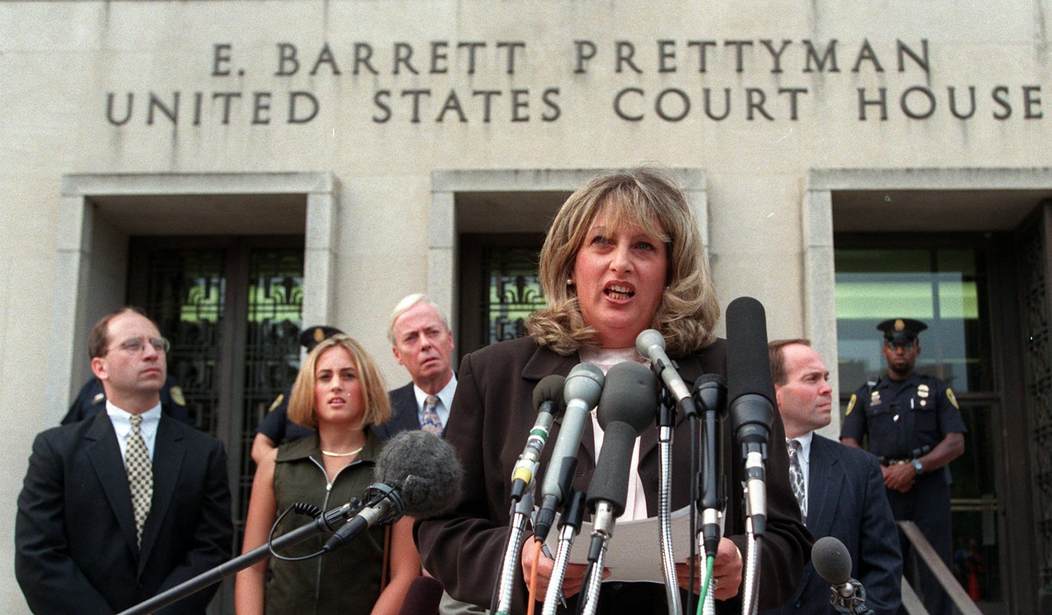WASHINGTON – Linda Tripp, the former White House aide who exposed the Clinton-Lewinsky scandal, said she would have handled the situation “no differently” if President Bill Clinton was a Republican.
“Despite the hardships and the personal pain, not only to us but to our families, when asked, most of us say we would do it all again,” Tripp said on Monday during a National Whistleblower Day event on Capitol Hill. “You know, in my case, had the circumstances been different and had the sitting incumbent been a Republican, I would have acted no differently at all.”
Tripp said the situation “was simply, at its core… about right and wrong, never left and right.”
“But what it was about was exposing perjury and the obstruction of justice,” she added. “It was just simply never about politics.”
Tripp called for “enhanced” whistleblower protections, which she said are long overdue.
“All of us as whistleblowers will not be fully protected until those who actively perpetrate the retaliation are individually, purposefully held accountable,” she said. “It’s not just the company or the agency that needs to be held accountable, but it should be the individual, one who does the bidding of those in high positions.”
Tripp worked at the Pentagon when she began recording conversations with Monica Lewinsky, a former co-worker, about the affair with Clinton. In 1998 she gave the tapes to independent counsel Ken Starr in exchange for immunity from wiretapping charges, and also notified him about Lewinsky’s stained blue dress.
Tripp said it is “virtually impossible” for whistleblowers to get their “good name back.”
“Too few of us are ever made whole again,” she said. “The vitriol, the attacks, the slander remain in the public domain and sort of color people’s thoughts forevermore. I’m not sure they ever really dissipate regardless of what you say or how loudly you say it. We must do it better.”
Tripp said she knows what it feels like to be “attacked viciously” because she said something people “did not want to hear” about a popular president.
“To politicians, only sides matter and the truth becomes the causality. I think we are all a bit different, Whistleblowers believe truth is not disposable, not dispensable, integrity and honor mean something,” she said.
Reflecting on Clinton-Lewinsky scandal, Tripp said her oath was to the office of the president, not the individual person in office. Tripp regrets not exposing Clinton’s actions sooner.
“I told the truth, but I do fault myself for not having the gumption or the courage to do it sooner. I was faced with a culture of corruption – and again, this is not partisan in any way – that was infecting the office of the presidency. I was quiet for many years. I was afraid on many levels to speak up,” she said.
In early 1998, Tripp said she began to “fully comprehend what the politics of personal destruction really means.” She recalled hearing the words “we’ll just have to destroy them” in the West Wing.
“I know what a real high-tech lynching feels like. I feel like that’s exactly what happened,” she said.
Tripp alluded to former first lady Hillary Clinton calling the Lewinsky scandal the result of a “vast right-wing conspiracy.”
“When the villain is magically victimized, which is essentially what happened, the wrongdoer became the victim. That’s when, in my case, the whistleblower was essentially destroyed through all of the allegations and the ridicule and humiliation that I suffered at the hands of a complicit media, certainly a willing entertainment industry. And it was very unpleasant for my family, and for that I will always be sorry,” she said. “When you speak truth to power, the powerful push back.”
Tripp described the Clinton-Lewinsky scandal as the event that gave birth to “advocacy journalism” in the 24-hour news cycle.
“I was pretty stunned at the portrayal. It colored the national dialogue. It formed national opinion based on very little fact at all and in my opinion victimized the wrong person,” she said. “I hope that my being here today can help change that dynamic even if just a little bit, so that future whistleblowers with just causes can avoid the harsh reality I faced.”
Tripp addressed critics who have argued that she exposed the affair for personal gain.
“What did I stand to gain then or now?” she asked. “I stood to lose everything and, in fact, I did. And yet if I had to do it all over again, I would. I couldn’t have lived with myself if I had failed to act. It was poorly done. There was no handbook, there was no manual that said this is how you take down a sitting president as a lowly civil servant.”
If she had done a better job taking “contemporaneous notes” and documenting everything she heard for two years, Tripp said Clinton may not have survived his term.
“It might have been the removal of a president from office,” she said. “What I provided to the independent counsel was insufficient; had I had the proof that I should have had, the result would have been different.”
Tripp likened public speaking to getting a root canal.
“Normally, a root canal would be preferable to speaking publicly; I tend to not do it,” she said.








Join the conversation as a VIP Member